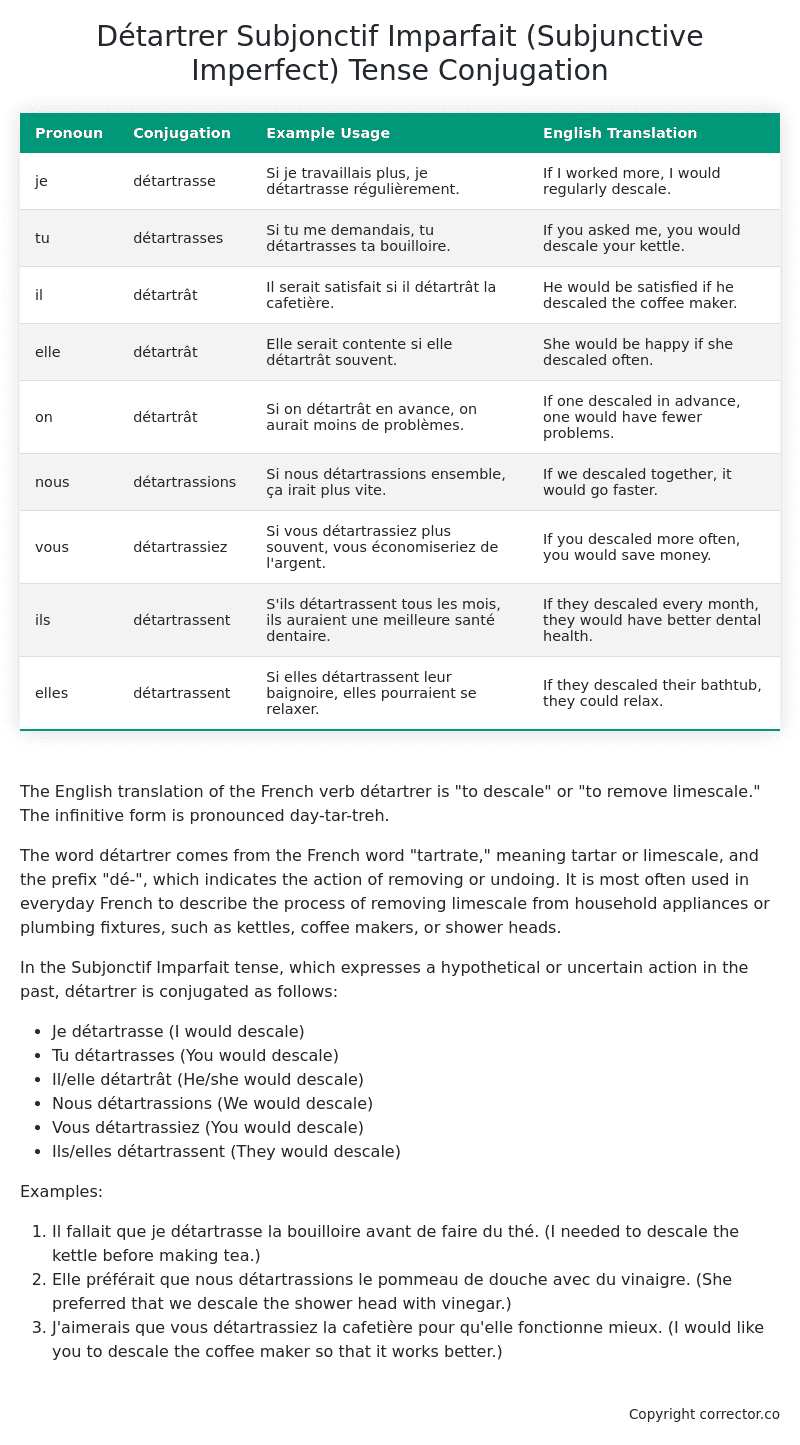Subjonctif Imparfait (Subjunctive Imperfect) Tense Conjugation of the French Verb détartrer
Introduction to the verb détartrer
The English translation of the French verb détartrer is “to descale” or “to remove limescale.” The infinitive form is pronounced day-tar-treh.
The word détartrer comes from the French word “tartrate,” meaning tartar or limescale, and the prefix “dé-“, which indicates the action of removing or undoing. It is most often used in everyday French to describe the process of removing limescale from household appliances or plumbing fixtures, such as kettles, coffee makers, or shower heads.
In the Subjonctif Imparfait tense, which expresses a hypothetical or uncertain action in the past, détartrer is conjugated as follows:
- Je détartrasse (I would descale)
- Tu détartrasses (You would descale)
- Il/elle détartrât (He/she would descale)
- Nous détartrassions (We would descale)
- Vous détartrassiez (You would descale)
- Ils/elles détartrassent (They would descale)
Examples:
- Il fallait que je détartrasse la bouilloire avant de faire du thé. (I needed to descale the kettle before making tea.)
- Elle préférait que nous détartrassions le pommeau de douche avec du vinaigre. (She preferred that we descale the shower head with vinegar.)
- J’aimerais que vous détartrassiez la cafetière pour qu’elle fonctionne mieux. (I would like you to descale the coffee maker so that it works better.)
Table of the Subjonctif Imparfait (Subjunctive Imperfect) Tense Conjugation of détartrer
| Pronoun | Conjugation | Example Usage | English Translation |
|---|---|---|---|
| je | détartrasse | Si je travaillais plus, je détartrasse régulièrement. | If I worked more, I would regularly descale. |
| tu | détartrasses | Si tu me demandais, tu détartrasses ta bouilloire. | If you asked me, you would descale your kettle. |
| il | détartrât | Il serait satisfait si il détartrât la cafetière. | He would be satisfied if he descaled the coffee maker. |
| elle | détartrât | Elle serait contente si elle détartrât souvent. | She would be happy if she descaled often. |
| on | détartrât | Si on détartrât en avance, on aurait moins de problèmes. | If one descaled in advance, one would have fewer problems. |
| nous | détartrassions | Si nous détartrassions ensemble, ça irait plus vite. | If we descaled together, it would go faster. |
| vous | détartrassiez | Si vous détartrassiez plus souvent, vous économiseriez de l’argent. | If you descaled more often, you would save money. |
| ils | détartrassent | S’ils détartrassent tous les mois, ils auraient une meilleure santé dentaire. | If they descaled every month, they would have better dental health. |
| elles | détartrassent | Si elles détartrassent leur baignoire, elles pourraient se relaxer. | If they descaled their bathtub, they could relax. |
Other Conjugations for Détartrer.
Le Present (Present Tense) Conjugation of the French Verb détartrer
Imparfait (Imperfect) Tense Conjugation of the French Verb détartrer
Passé Simple (Simple Past) Tense Conjugation of the French Verb détartrer
Passé Composé (Present Perfect) Tense Conjugation of the French Verb détartrer
Futur Simple (Simple Future) Tense Conjugation of the French Verb détartrer
Futur Proche (Near Future) Tense Conjugation of the French Verb détartrer
Plus-que-parfait (Pluperfect) Tense Conjugation of the French Verb détartrer
Passé Antérieur (Past Anterior) Tense Conjugation of the French Verb détartrer
Futur Antérieur (Future Anterior) Tense Conjugation of the French Verb détartrer
Subjonctif Présent (Subjunctive Present) Tense Conjugation of the French Verb détartrer
Subjonctif Passé (Subjunctive Past) Tense Conjugation of the French Verb détartrer
Subjonctif Imparfait (Subjunctive Imperfect) Tense Conjugation of the French Verb détartrer (this article)
Subjonctif Plus-que-parfait (Subjunctive Pluperfect) Tense Conjugation of the French Verb détartrer
Conditionnel Présent (Conditional Present) Tense Conjugation of the French Verb détartrer
Conditionnel Passé (Conditional Past) Tense Conjugation of the French Verb détartrer
L’impératif Présent (Imperative Present) Tense Conjugation of the French Verb détartrer
L’infinitif Présent (Infinitive Present) Tense Conjugation of the French Verb détartrer
Struggling with French verbs or the language in general? Why not use our free French Grammar Checker – no registration required!
Get a FREE Download Study Sheet of this Conjugation 🔥
Simply right click the image below, click “save image” and get your free reference for the détartrer Subjonctif Imparfait tense conjugation!

Détartrer – About the French Subjonctif Imparfait (Subjunctive Imperfect) Tense
Formation
Common Everyday Usage Patterns
Interactions with Other Tenses
Subjonctif Présent
Indicatif Passé Composé
Conditional
Conditional Perfect
Summary
I hope you enjoyed this article on the verb détartrer. Still in a learning mood? Check out another TOTALLY random French verb conjugation!


